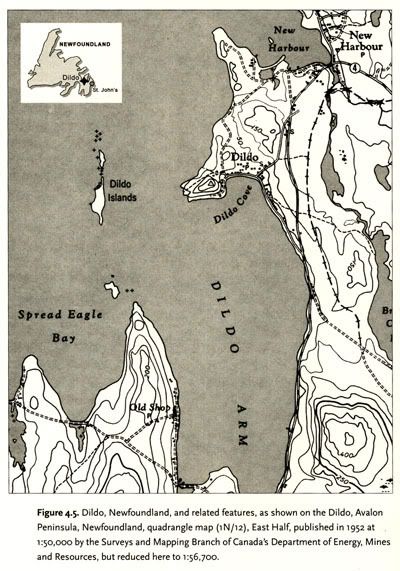Titillation from Newfie toponyms

Above is a map from p. 68 of Mark Monmonier's book From Squaw Tit to Whorehouse Meadow: How Maps Name, Claim, and Inflame. The accompanying text is pretty amusing. After discussing, unfruitful, efforts by a Mr. Robert Elford, to change the name of the village of Dildo, Newfoundland, in 1985, Monmonier goes on to say of Newfoundland naming practices:
Diverse factors account for Elford's failure. His initiative laked the homophobic imperative behind the renaming of Gayside, Newfoundland (now Baytona[!!!]), in 1985 or whatever anti-Soviet feeling inspired the renaming of Mount Stalin [now that must be a tale] (a British Columbia landmark now commemorating Don Peck, a highly regarded local conservationist) in 1987. Local residents had few reminders of Dildo's new potentially offensive connotation-sex aids were not a regular feature in the news or a lingering icon of cold war rhetoric-and those with a sense of humor could delight in the salacious juxtaposition of Dildo Arm and Spread Eagle Bay (fig 4.5 [see above]. Indeed, jokes about the name were a way of being noticed, and perhaps an attraction to tourists who might stop by to mail a postcard or sample local hospitality during Dildo Days, a mid-August weekend featuring "a live band...enjoyable games and activities, [and {sic}] a beer tent for people 19 and older." The long standing name was reinforced by its identification of several nearby natural features, and the village had its own postal code (AoB IPo), which would entail the cost and annoyance of changing one's address. What's more, some Dildodians no doubt felt the same sense of priority as residents of Swastika, Ontario, who resisted the provincial government's renaming of their community in 1940 to honor Winston Churchill [interestingly, Swastika's mines were the source of some of the Mitford family's minimal wealth, and the ever delightful Unity claimed to have been conceived there]. Defiantly they ripped down the official sign and put up a replacement proclaiming, "To Hell with Hitler. We had the swastika first."pp.67-69
As an aside, my initial posting was solely motivated by the amusing graphic, but the Mitford connection is one of those things that makes the internet so gosh darn wonderful.
